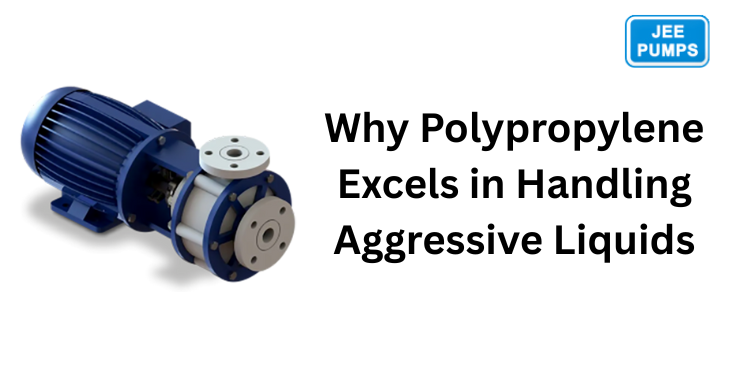In process and chemical plants, dealing with aggressive or corrosive fluids is a major concern. From acids and bases to aggressive solvents, these fluids can destroy equipment and pose safety risks if not treated properly. That is why the proper choice of material for pumps, pipes, and tanks is so important.
Among all the myriad materials out there, polypropylene stands out especially. It's widely utilized in industries worldwide due to its corrosion resistance and long-term performance. And with Polypropylene Monoblock Pumps , the material is an even more robust fluid handling solution.
Section 1: What Makes a Liquid "Aggressive"?
Aggressive fluids are not milk or ordinary water. Aggressive fluids are chemicals that react violently with materials and cause corrosion, degradation, or dangerous reactions. Hydrochloric acid, sulfuric acid, and caustic soda are some examples.
These liquids must be handled by materials not just lasting long, but also reliably operating under pressure. If your storage tank or pump fails, it can cause spills, leaks, or catastrophic accidents. That's why businesses must have reliable materials to store corrosive liquids safely—and polypropylene is an excellent option.
Section 2: Polypropylene – The Basics
So, what is polypropylene? It's a thermoplastic polymer that is made from propylene gas. It's tough, light, and resistant to heat. Polypropylene's a very handy material that's used on anything from auto components to food packages—and, yes, industrial liquid handling systems.
One of its best features is that it is resistant to a wide range of chemicals. While metal corrodes or rusts, polypropylene is resistant to acids and bases without either losing elasticity or weakening. It is therefore particularly valuable in applications where continued chemical exposure is the rule.
Section 3: Increased Chemical Resistance
Polypropylene not only resists some chemicals—it resists many chemicals. It is able to withstand aggressive chemicals like nitric acid, acetic acid, and sodium hydroxide. That's why businesses handling pharmaceuticals, chemical processing, and water treatment prefer polypropylene.
When used in conjunction with Polypropylene Monoblock Pumps, this material forms a hard anti-corrosion barrier. These pumps are designed to pump abrasive liquids efficiently and safely, without the abrasion and wear you would experience in metal or other plastic pumps.
Section 4: Light but Strong – A Perfect Blend
Heavy-duty does not necessarily equate to weight. Polypropylene is really light in weight compared to stainless steel or other materials. This is a positive aspect since it is easier to install and handle in systems, particularly where mobility or flexibility is required.
Although it is of light weight, polypropylene is strong. It won't break when pushed or melt when exposed to heat. It can be shaped into intricate forms, and designers can design robust, unbroken parts such as Polypropylene Monoblock Pumps that won't malfunction in harsh environments.
Section 5: Long-Term Cost Efficiency
Let's talk of money. Because you are investing in fluid handling systems, you would want to reduce repairs, downtime, and replacement. Polypropylene accomplishes that for you. Because of its chemical and physical stress resistance, it lasts longer.
Also, in Polypropylene Monoblock Pumps, fewer spare parts or specialized coatings are needed. They do not rust, unlike metal ones, so fewer breakdowns. That is less maintenance, lower labor, and more uptime for your business.
Section 6: Safety Above All
Safety comes first in operations involving hostile liquids. Leaks, spills, or contact with chemicals cause serious injuries or damage to the environment. Polypropylene is inert, and therefore the risk of chemical reaction is reduced, and therefore the work environment is safe.
Furthermore, Polypropylene Monoblock Pumps are constructed with high precision to prevent leakage and sustain pressure fluctuations well. Hence, they are suitable for delicate processes such as wastewater treatment or the production of chemicals, where precision and safety cannot be sacrificed.
Section 7: Low Maintenance, High Reliability
One of the best features of using polypropylene is that it is extremely easy to maintain. It refuses to rust, crack, or deteriorate like most other materials. That leaves less time spent inspecting and repairing equipment.
When properly installed, Polypropylene Monoblock Pumps will endure for years with minimal maintenance. This is especially helpful on the job site or in a large plant where maintenance is both money and time intensive. Polypropylene simply gets the job done—quietly and reliably.
Section 8: Environmentally Friendly Option
Polypropylene is also more environmentally friendly than most industrial materials. It's recyclable, so the material can be reused or reprocessed instead of being disposed of in the landfill.
Also, because Polypropylene Monoblock Pumps are extremely durable, they would not need to be replaced frequently. This reduces manufacturing requirement, power usage, and wastage in the long term. If your company is dedicated to sustainability, polypropylene would be a responsible and smart choice.
Section 9: Real-World Applications That Make the Point
You don't have to go far to find polypropylene in action. It's used near water treatment facilities, chemical facilities, agricultural equipment, and even food processing facilities. In all these sectors, handling aggressive liquids is commonplace. The companies that utilize Polypropylene Monoblock Pumps experience less corrosion, less leakage, and improved efficiency. Acid, alkaline solution, or wastewater pumping, these pumps provide you with the assurance you require in high-hazard applications.
The Clear Choice for Aggressive Fluids
Choosing the right material to deal with aggressive liquids isn't a matter of technical option—rather, it is a matter of safety, economy, and efficiency. Polypropylene is one material that fulfills all these needs and more. Its superior chemical resistance, strength, low maintenance requirement, and safety features make it the ideal material for industries now. When combined with Polypropylene Monoblock Pumps, you have a complete, tough, and high-performance solution. System upgrade or build from the ground up, polypropylene is the smart, safe, and progressive solution.


